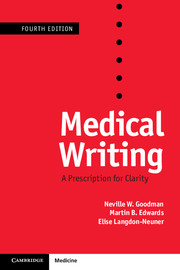Book contents
- Frontmatter
- Dedication
- Epigraph
- Contents
- Foreword
- Preface to the fourth edition
- Layout of the fourth edition
- Preface to the first edition
- Acknowledgements
- Part I Problem: the illness
- Part II Solution: symptomatic relief
- 4 Technology, changing language and authority
- 5 Guidelines to clearer writing
- 6 Spelling
- 7 Is there a better word?
- 8 Superfluous words
- 9 Imprecise words
- 10 Superfluous phrases
- 11 Trouble with short words
- 12 Use of the passive voice
- 13 Consistency: number and tenses
- 14 Word order
- 15 Punctuation
- 16 Circumlocution
- 17 Words and parts of speech for EAL writers
- 18 Clichés and article titles
- 19 Constructing sentences
- 20 Further help with sentences for EAL writers
- 21 Drawing clear graphs
- 22 It can be done
- Part III Practice: recuperation
- Appendix British–American English
- References and further reading
- Index
18 - Clichés and article titles
Published online by Cambridge University Press: 05 September 2014
- Frontmatter
- Dedication
- Epigraph
- Contents
- Foreword
- Preface to the fourth edition
- Layout of the fourth edition
- Preface to the first edition
- Acknowledgements
- Part I Problem: the illness
- Part II Solution: symptomatic relief
- 4 Technology, changing language and authority
- 5 Guidelines to clearer writing
- 6 Spelling
- 7 Is there a better word?
- 8 Superfluous words
- 9 Imprecise words
- 10 Superfluous phrases
- 11 Trouble with short words
- 12 Use of the passive voice
- 13 Consistency: number and tenses
- 14 Word order
- 15 Punctuation
- 16 Circumlocution
- 17 Words and parts of speech for EAL writers
- 18 Clichés and article titles
- 19 Constructing sentences
- 20 Further help with sentences for EAL writers
- 21 Drawing clear graphs
- 22 It can be done
- Part III Practice: recuperation
- Appendix British–American English
- References and further reading
- Index
Summary
People who write obscurely are either unskilled in writing or up to some mischief.
(Sir Peter Medawar, 1915–1987, British biologist. The threat and the glory, D. Pyke, ed., Oxford, Oxford University Press, 1990.)Literary devices and figures of speech are not prominent in routine research papers, but are more likely in editorials and opinion pieces. Used properly, they enliven writing, which is why columnists – both in newspapers and magazines and in their medical equivalents – use them.
Metaphor is the most important and widespread figure of speech, and is (COD) the application of name or descriptive term to an object or action to which it is imaginatively but not literally applicable. It suggests a shared property. It is metaphorical when we write that a drug ‘locks onto’ a receptor, suggesting that drugs and receptors are like keys and locks. In previous chapters we have mentioned drawback (its original meaning now less well-known than its metaphorical one), elevated from bishop to archbishop, falling into groups, hormones having a role, a graveyard full of failed treatments, focusing a service, examining cars in depth, and a cocktail of drugs.
There are two reasons to be wary of metaphors: first, readers may misinterpret them, especially EAL readers, who may not understand them at all; and second, metaphors have a tendency to descend pretty quickly to cliché. Metaphors are intended to enliven writing; clichés, because they are overused, deaden it. There is no strict definition of cliché; nor is there a list in which to check whether a chosen metaphor has degenerated to cliché. As The Economist’s guide (see reference books) points out, ‘clichés weren’t always clichéd. The first person to use window of opportunity . . . was justly pleased with himself. [It] is a strong, vivid expression – or was. The trouble is that such expressions have been copied so often that they have lost their vividness.
- Type
- Chapter
- Information
- Medical WritingA Prescription for Clarity, pp. 285 - 293Publisher: Cambridge University PressPrint publication year: 2014



